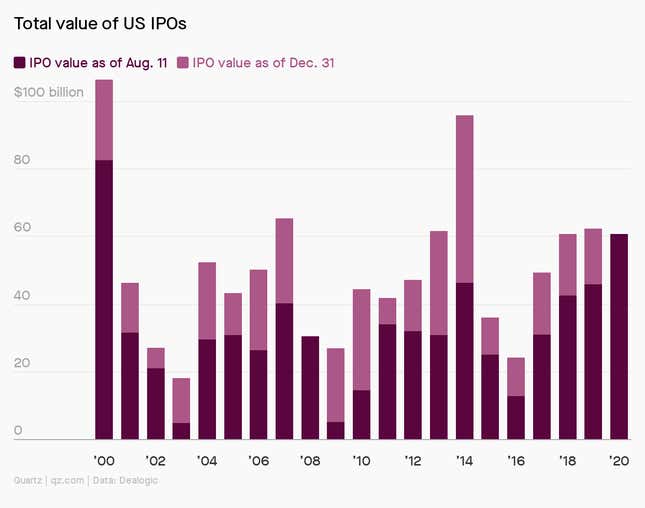Good morning, Quartz readers!
Here’s what you need to know
Congress is returning early for a vote on the US postal service. House speaker Nancy Pelosi is trying to block operational changes at the USPS, with Democrats cutting their vacations short this week, after president Donald Trump opposed vital funding because of his unfounded concerns over voting fraud.
Japan’s economy shrank by nearly 28% from April-June. That’s compared to the same quarter last year, and it’s also the third straight quarterly fall in GDP for the world’s third-largest economy.
The British government is under severe pressure over high school grades. With exams canceled, students’ performances were partly assessed by a controversial algorithm. College applications are in disarray after 40% of them achieved grades lower than their teachers’ predictions.
Massive crowds took to the streets in Belarus. As many as 200,000 people turned up to the biggest demonstration in the country’s history, protesting police violence and a disputed election. President Alexander Lukashenko has rejected calls for a repeat vote, and more strikes are expected today.
India’s opposition says Facebook favors the ruling party. The Congress party called for an investigation of the social media giant spurred by reporting from the Wall Street Journal that suggested Facebook bends its rules to help prime minister Narendra Modi’s BJP party.
What to watch for this week
Monday: The UK and the EU begin another round of trade talks. The US and Russia meet in Vienna to discuss nuclear arms control. Huawei CFO Meng Wangzhou’s extradition hearing resumes.
Tuesday: Lebanon hears the verdict on the 2005 assassination of prime minister Rafik Hariri.
Wednesday: The EU, UK, and Canada release inflation data. OPEC+ is expected to extend current oil production cuts as the pandemic continues to depress demand.
Thursday: Joe Biden accepts the Democratic nomination—remotely—at the party convention.
Friday: Mahatma Gandhi’s gold-plated glasses go to auction.
The global fight for Hong Kong

Hong Kong’s pro-democracy Umbrella movement made international headlines in 2014 but drew limited concrete political support from governments. This year, Hong Kong has emerged as a global issue, taken up at the highest levels of government in some of the world’s most powerful nations. What changed?
The movements’ activists realized that they needed people who understood the intricacies of politics in the UK and US—to get “beyond the photo-ops” to gain concrete political support. One of those people was Samuel Chu—a native Hong Konger with close ties to the city’s democracy movement, and a veteran community organizer in the US, with deep Capitol Hill connections.
Last September, Chu launched the Hong Kong Democracy Council (HKDC), a Washington-based advocacy group. It has since held hundreds of meetings with Congress, lobbied to get major bills passed, including the Hong Kong Human Rights and Democracy Act, and led efforts to introduce more than a dozen Hong Kong-related legislations.
The Hong Kong police force last month put out an extraterritorial arrest warrant for Chu, a US citizen of 25 years, accusing him of inciting secession and colluding with foreign forces. Read more about his activism, and how the fight for Hong Kong went global, in our latest field guide.
Obsession interlude
Every Quartz Obsession has its million-dollar question. For 🧯 The Climate Economy, it’s this:
Will the disruption of the pandemic hobble or turbo-charge climate efforts?
Economic disruption cratered demand for fossil fuels—some of which might never return. A recent report projected that oil demand won’t bounce back to pre-pandemic levels until at least 2022. Oil companies, sensing the decline, have written down their asset value by tens of billions of dollars. More coal-fired power plants are shutting down than are opening.
At the same time, the clean-energy industry has lost hundreds of thousands of jobs. Many countries are investing in emissions-heavy sectors like airlines and power plants, and the business model for some promising emissions-reductions technology is being upended.
We’ll be keeping track of trends making the planet more livable, or pushing it closer to the brink: from racial justice in flood-prone housing markets, to the crumbling budgets of fossil-fuel-addicted governments, to disposable wipes (they’re not really disposable!).
Here’s how to read more:
- What coronavirus means for climate change
- Coronavirus may get America to pass its biggest climate bill yet
- The world is blowing its chance for a green recovery
- Oil and gas companies might never recover from Covid-19
Charting the booming US IPO market
Even amid a global pandemic, 2020 is on pace to be the best year for US IPOs since the dot-com bubble. Listings slowed to a trickle in the first quarter, but are roaring back to their highest year-to-date levels since 2000.

If 2020 maintains its feverish IPO pace, it’ll be thanks in large part to expected listings from buzzy tech firms like Palantir, DoorDash, and Airbnb. The year has already seen B2B software company ZoomInfo raise nearly $1 billion, followed by offerings from insurance tech firm Lemonade and Apple software manager Jamf in July. It may be another sign that the US is building up its next dot-com bubble.
Surprising discoveries
Scammers posed as hotel staff at the Ritz in London. The fraudsters phoned their targets with exact details of restaurant bookings, then stole their payment card details.
Facebook forgot some drilling equipment on the ocean floor. An undersea cable subsidiary abandoned tools, broken pipes, and thousands of gallons of drilling fluid off the coast of Oregon.
A lucky Chinese phone number fetched $300,000 at an auction. The number ends in five eights—which in Mandarin sound like the word for “prosperity.”
Tiehm’s buckwheat could derail the first lithium mine in the US. A swath of Nevada desert rich in lithium and boron is also home to the rare plant, which grows almost nowhere else.
An Amazonian frog engages in cannibalistic love triangles. Each male mates with two females, who sometimes try to eat each other’s offspring to give their kids an advantage.
Our best wishes for a productive day. Please send any news, comments, buckwheat blooms, and drilling tools to hi@qz.com. Get the most out of Quartz by downloading our app on iOS and becoming a member. Today’s Daily Brief was brought to you by Hasit Shah, Jackie Bischof, Nicolás Rivero, and Ana Campoy.